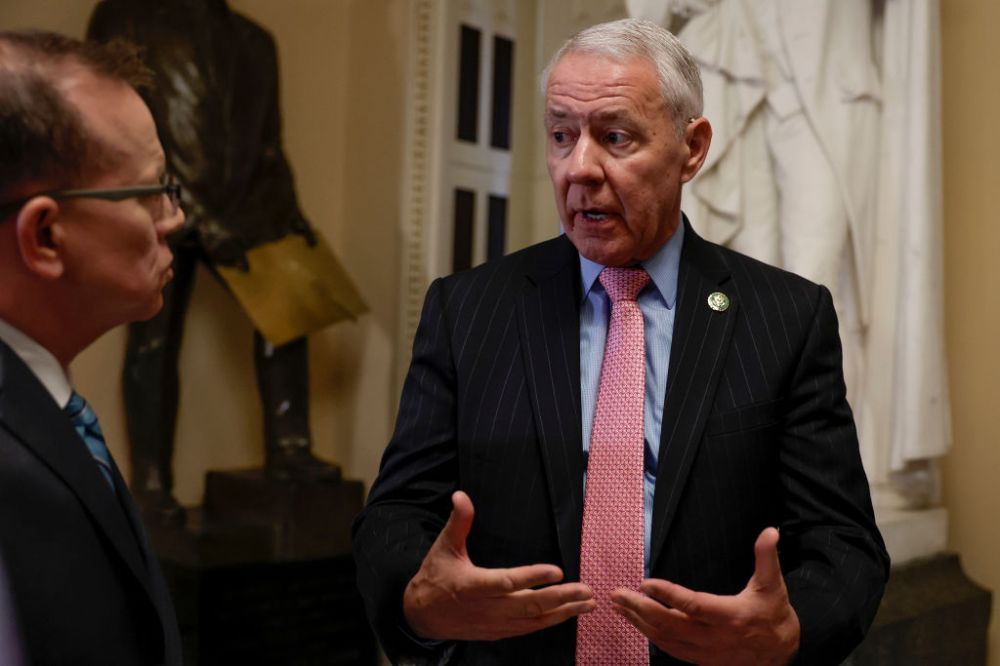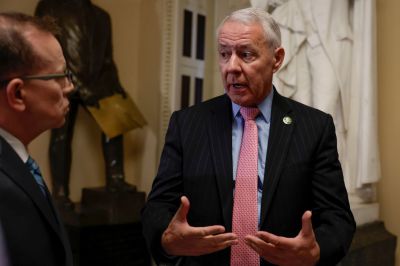Members of the House Freedom Caucus spent last week slamming House Speaker Kevin McCarthy’s debt ceiling deal with President Joe Biden. But don’t expect the group to force a vote on ousting McCarthy any time soon.
House conservatives have knocked the agreement, which suspends the debt ceiling until after next year’s presidential election, as a betrayal of Republican voters and a continuation of government spending run amok. Despite the intense rhetoric, and the Freedom Caucus’ power in a slim House Republican majority, the group has modest goals.
Members this week are looking to move onto future spending fights and investigations, while others plan to meet privately with McCarthy to discuss where they think the debt ceiling negotiations went wrong. Whether to throw McCarthy’s leadership into question didn’t even come up at the group’s meeting Monday night, according to Freedom Caucus chairman Scott Perry.
Over the weekend, one of the loudest critics of the deal, Rep. Ken Buck of Colorado, told CNN he was skeptical about forcing a vote on whether to remove McCarthy using a procedural tool.
“I think there has to be a consensus” within the GOP conference, he said of holding a vote on the speaker. “I applaud Kevin McCarthy for saying he wants to bring people back together again. Let’s see if he does that in a way that involves spending responsibly in the future.”
Theoretically the motion to vacate the chair could be used by just a few people, without consensus from the broader Republican conference. Any one member can force the question under the chamber’s current rules, and that member would need only a handful of allies to be successful unless Democrats chose to help McCarthy.
But Buck’s comments show a sense of realism about how such a fight would unfold: If challenged, the vast majority of House Republicans would rally around McCarthy. Conservative critics wouldn’t have a consensus alternative to offer. Members would probably find themselves back in the same position they were in January, when McCarthy struck a deal with his detractors after 15 rounds of voting to claim the gavel.
That January deal, which handed more power to the House Freedom Caucus, may be why McCarthy seems poised to weather the debt ceiling storm, even after seriously frustrating conservatives. He placed leading insurgents in positions of influence, like the House Rules Committee. He embraced fringe members like Rep. Marjorie Taylor Greene as close allies. He set up an investigative panel his critics wanted, helmed by conservative Rep. Jim Jordan.
Trying to oust McCarthy over the debt limit legislation would be “blowing up the best arrangement you could ever hope for and ending the possibility of somebody trying the ‘power sharing’ model again,” Liam Donovan, a lobbyist at Bracewell LLP and former GOP operative, told The Dispatch.
There’s also a powerful desire to move on. Former Rep. Justin Amash, a founding member of the Freedom Caucus, predicted as much in January. The motion to vacate, he said, “isn’t a serious threat to any speaker” except in extraordinary circumstances like criminality or ethics. “Nobody wants to call a vote of no confidence in the middle of a term; it’s happened only once and failed,” Amash wrote.
Lawmakers are ready to move onto other issues. And they have a grueling few months ahead of them. If they really want to pass all 12 appropriations bills to fund the government on time as Republicans demanded in the debt ceiling talks, they’ll have to buckle down and put pen to paper soon. Conservatives will be watching to make sure congressional leaders don’t use any gimmicks or separate emergency funding bills to get around the debt ceiling bill’s spending limits.
Some Senate Republicans, such as Sen. Lindsey Graham, have urged passage of a supplemental defense package to provide more aid to Ukraine as it defends itself against Russia. Graham is worried the debt limit bill’s slight increase in defense spending will amount to a cut when factoring in inflation. McCarthy on Monday night pushed back on the idea of a defense supplemental, saying the Senate will have to stay within the spending numbers negotiated in the debt deal.
“The senators are not paying attention to how the system works,” McCarthy told reporters. “The idea that they think they’re going to go around it is not going to work.”
On the Floor
The House is considering the “Gas Stove Protection and Freedom Act” and the “Save Our Gas Stoves Act” this week. A list of other bills expected to receive votes this week is available here.
The Senate continues to consider executive nominations. You can follow floor activity through the week here.
Key Hearings
- Department of Homeland Security Inspector General Joseph Cuffari is testifying this morning before a House Oversight and Accountability panel about staffing challenges on the southern border. Information and livestream here.
- The House Science, Space, and Technology Committee will hold a hearing Wednesday morning on advancing American leadership in quantum computing. Information and livestream here.
- Senators on the Foreign Relations Committee will examine America’s approach to China and where it connects and differs with European countries’ policies during a hearing Wednesday afternoon. Information and livestream here.
- A Senate Judiciary subcommittee will meet Wednesday afternoon for a hearing on artificial intelligence and intellectual property. Information and livestream here.






Please note that we at The Dispatch hold ourselves, our work, and our commenters to a higher standard than other places on the internet. We welcome comments that foster genuine debate or discussion—including comments critical of us or our work—but responses that include ad hominem attacks on fellow Dispatch members or are intended to stoke fear and anger may be moderated.
With your membership, you only have the ability to comment on The Morning Dispatch articles. Consider upgrading to join the conversation everywhere.